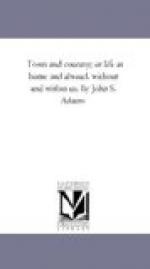my duty to see it fed;
If the parents will send to me to buy,
Do you think I’d let the chance go by
To get me gain? O, I’m no such fool;
That is not taught in the world’s wide school!
“When the old man comes with nervous gait,
Loving, yet cursing his hapless fate,
Though children and wife and friends may meet,
And me with tears and with sighs entreat
Not to sell him that which will be his death,
I’ll hear what the man with money saith;
If he asks for rum and shows the gold,
I’ll deal it forth, and it shall be sold!
“Ah! do you say, ’I should heed the cries
Of weeping friends that around me rise’?
May be you think so; I tell you what,—
I’ve a rule which proves that I should not;
For, know you, though the poison kill,
If I don’t sell it, some others will!”
A strange fatality came on all men,
Who met upon a mountain’s rocky side;
They had been sane and happy until then,
But then on earth they wished not to abide.
The sun shone brightly, but it had no charm;
The soft winds blew, but them did not elate;
They seemed to think all joined to do them harm,
And urge them onward to a dreadful fate.
I did say “all men,” yet there were a few
Who kept their reason well,—yet, weak, what could they do?
The men rushed onward to the jagged rocks,
Then plunged like madmen in their madness o’er;
From peak to peak they scared the feathered flocks,
And far below lay weltering in their gore.
The sane men wondered, trembled, and they strove
To stay the furies; but they could not do it.
Whate’er they did, however fenced the drove,
The men would spring the bounds or else break through it,
And o’er the frightful precipice they leaped,
Till rock and tree seemed in their red blood steeped.
One of the sane men was a great distiller
And one sold liquors in a famous city;
And, by the way, one was an honest miller,
Who looked on both their trades in wrath and pity.
This good “Honestus” spoke to them, and said,
“You’d better jump; if you don’t, others will.”
Each took his meaning, yet each shook his head.
“That is no reason we ourselves should kill,”
Said they, while very stupid-brained they seemed,
As though they of the miller’s meaning never dreamed.
If the parents will send to me to buy,
Do you think I’d let the chance go by
To get me gain? O, I’m no such fool;
That is not taught in the world’s wide school!
“When the old man comes with nervous gait,
Loving, yet cursing his hapless fate,
Though children and wife and friends may meet,
And me with tears and with sighs entreat
Not to sell him that which will be his death,
I’ll hear what the man with money saith;
If he asks for rum and shows the gold,
I’ll deal it forth, and it shall be sold!
“Ah! do you say, ’I should heed the cries
Of weeping friends that around me rise’?
May be you think so; I tell you what,—
I’ve a rule which proves that I should not;
For, know you, though the poison kill,
If I don’t sell it, some others will!”
A strange fatality came on all men,
Who met upon a mountain’s rocky side;
They had been sane and happy until then,
But then on earth they wished not to abide.
The sun shone brightly, but it had no charm;
The soft winds blew, but them did not elate;
They seemed to think all joined to do them harm,
And urge them onward to a dreadful fate.
I did say “all men,” yet there were a few
Who kept their reason well,—yet, weak, what could they do?
The men rushed onward to the jagged rocks,
Then plunged like madmen in their madness o’er;
From peak to peak they scared the feathered flocks,
And far below lay weltering in their gore.
The sane men wondered, trembled, and they strove
To stay the furies; but they could not do it.
Whate’er they did, however fenced the drove,
The men would spring the bounds or else break through it,
And o’er the frightful precipice they leaped,
Till rock and tree seemed in their red blood steeped.
One of the sane men was a great distiller
And one sold liquors in a famous city;
And, by the way, one was an honest miller,
Who looked on both their trades in wrath and pity.
This good “Honestus” spoke to them, and said,
“You’d better jump; if you don’t, others will.”
Each took his meaning, yet each shook his head.
“That is no reason we ourselves should kill,”
Said they, while very stupid-brained they seemed,
As though they of the miller’s meaning never dreamed.
NOT MADE FOR AN EDITOR.
Being A true account of an incident in the history of the Stubbs family.
Mr. and Mrs. Stubbs were seated at the side of a red-hot cylinder stove. On one side, upon the floor, a small black-and-white dog lay very composedly baking himself; on the other, an old brown cat was, in as undisturbed a manner, doing the same. The warmth that existed between them was proof positive that they had not grown cold towards each other, though the distance between them might lead one to suppose they had.




